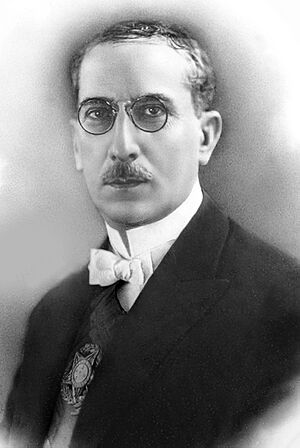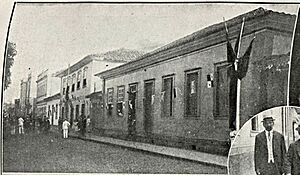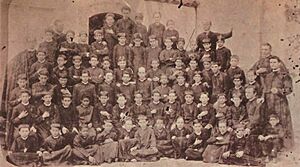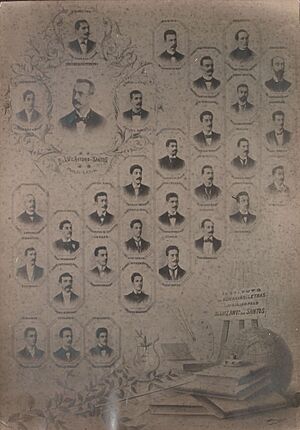Artur Bernardes facts for kids
Quick facts for kids
Artur Bernardes
|
|||||||||||||||||||||||||||||||
|---|---|---|---|---|---|---|---|---|---|---|---|---|---|---|---|---|---|---|---|---|---|---|---|---|---|---|---|---|---|---|---|

Official portrait, 1922
|
|||||||||||||||||||||||||||||||
| President of Brazil | |||||||||||||||||||||||||||||||
| In office 15 November 1922 – 15 November 1926 |
|||||||||||||||||||||||||||||||
| Vice President | Estácio Coimbra | ||||||||||||||||||||||||||||||
| Preceded by | Epitácio Pessoa | ||||||||||||||||||||||||||||||
| Succeeded by | Washington Luís | ||||||||||||||||||||||||||||||
|
|||||||||||||||||||||||||||||||
| Personal details | |||||||||||||||||||||||||||||||
| Born |
Artur da Silva Bernardes
8 August 1875 Viçosa, Minas Gerais, Empire of Brazil |
||||||||||||||||||||||||||||||
| Died | 23 March 1955 (aged 79) Rio de Janeiro, Federal District, Brazil |
||||||||||||||||||||||||||||||
| Political party | PRM (1900–1937) UDN (1945) PR (1945–1955) |
||||||||||||||||||||||||||||||
| Spouse |
Clélia Vaz de Melo
(m. 1903) |
||||||||||||||||||||||||||||||
| Alma mater | Faculty of Law of Largo de São Francisco | ||||||||||||||||||||||||||||||
| Signature | |||||||||||||||||||||||||||||||
Artur da Silva Bernardes (born August 8, 1875 – died March 23, 1955) was a Brazilian lawyer and politician. He served as the 12th President of Brazil from 1922 to 1926. His time as president was difficult, marked by problems in the First Brazilian Republic. The country was almost constantly under a state of emergency, meaning the government had special powers.
Before becoming president, Bernardes was the governor of Minas Gerais from 1918 to 1922. During this time, he started the Federal University of Viçosa. He also stopped an American investor from taking over iron ore mines in Itabira. This made him seem like a leader who cared about Brazil's resources and local communities.
Bernardes was a candidate who supported the existing political system. He was part of the "milk coffee" agreement between powerful states. During the 1922 election, fake letters were spread to hurt his image. There was even an attempted coup, the Copacabana Fort revolt, to stop him from becoming president. His government was not popular in cities like Rio de Janeiro. From 1924 onwards, he faced many plots and armed revolts from young military officers called tenentists.
Bernardes was very strict with those who opposed him. In states that didn't support his election, their main political parties were removed. Rio Grande do Sul even had a civil war, the Revolution of 1923. Bernardes' government also focused on strict economic policies to control inflation. Brazil left the League of Nations, an international organization. He also made changes to the country's main rules (the constitution). He worked closely with the Catholic Church and passed some labor laws, but he also cracked down on worker groups. After his presidency, Bernardes supported the Revolution of 1930. He was seen as a serious and private person. His supporters admired him, while his opponents disliked him.
Early Life and Education
Artur da Silva Bernardes was born on August 8, 1875. He was born in a village called Santa Rita do Turvo, which is now Viçosa. Some people say he was born in a different town, Cipotânea, and moved to Viçosa when he was five. Artur was the fourth of nine children. His parents were Antônio da Silva Bernardes and Maria Aniceta Bernardes. One of his brothers, Olegário, later became a minister and a mayor.
Artur's mother came from a wealthy family that grew coffee. His father was a Portuguese immigrant. He was a colonel in the National Guard and a lawyer. The family had enough money to pay for Artur's education. However, they were not part of the most powerful political families in their area.
Bernardes received a very strict education at home. He then went to the Caraça School for high school in 1887, when he was 12. This school was one of the most respected in Brazil. It was known for its strict rules, limited visits, and punishments. This experience taught Bernardes to value discipline and order. It also strengthened his Catholic faith.
Some people believed the school helped him become a good public servant. They said it taught him to be careful with government money. Others, who didn't like him, said the school made him too strict and interested only in rules, not people's feelings.
In 1889, Bernardes' family faced financial problems. This was because slavery was abolished in Brazil, which affected the coffee economy. Bernardes found a job at a coffee trading company. This job taught him about the rural world and the coffee business. He later became an accountant at another firm, showing he was trustworthy. This work also showed him the challenges of modern farming.
Studying Law and Journalism
By late 1894, his family's finances improved. Bernardes was able to enroll in a law school in Ouro Preto. He studied for entrance exams while working at newspapers and as a mail courier. In 1896, he officially started studying law.
As a law student, Bernardes became friends with future political allies. He also met other important figures in Brazilian politics. He volunteered for a military battalion during the War of Canudos, but his unit did not fight. Bernardes admired Floriano Peixoto, a former president. He also helped start a newspaper called Academia.
Later, Bernardes transferred to the Faculty of Law of São Paulo. This school offered better opportunities for a public career. Many future Brazilian presidents studied there. In São Paulo, Bernardes worked as an editor for a newspaper. He also taught Portuguese and Latin. He became known for his legal skills, even defending someone against his own father in court.
In December 1900, Bernardes earned his law degree. He was chosen to give the graduation speech, showing he was respected by his classmates. When he returned to his hometown, he was welcomed as a local hero. Being a lawyer greatly improved his social standing. There were few qualified lawyers in his area, and lawyers played a big role in the Brazilian government.
At 25, Bernardes opened his own law firm in Viçosa. His father even resigned from his prosecutor job to avoid conflicts of interest. Bernardes also started working for a local newspaper, Cidade de Viçosa. This newspaper was owned by a local political leader. Bernardes was clearly interested in politics. He wrote articles for the newspaper, including one about changing Brazil's 1891 Constitution.
Honours
Foreign Honours
 Grand Officer of the Order of Christ, Portugal (17 May 1958)
Grand Officer of the Order of Christ, Portugal (17 May 1958)
See also
 In Spanish: Artur Bernardes para niños
In Spanish: Artur Bernardes para niños




